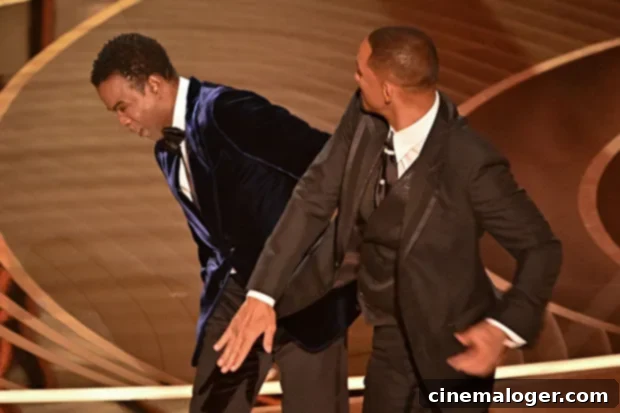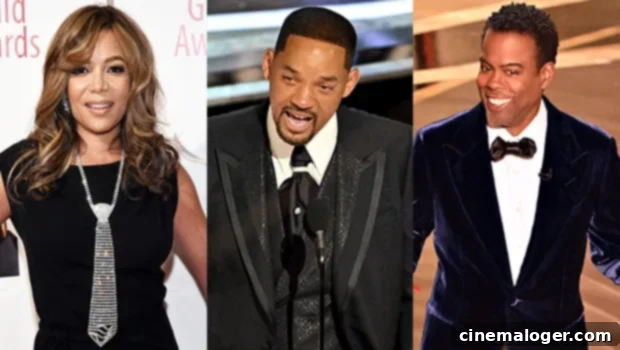Sunny Hostin Condemns Will Smith’s Oscars Slap: Why a Direct Apology to Chris Rock Was Crucial
The 94th Academy Awards ceremony on March 27, 2022, was undeniably marked by an event that overshadowed all other triumphs and celebrations: the moment when Will Smith walked onto the stage and slapped Chris Rock after the comedian made a joke about Smith’s wife, Jada Pinkett Smith. The incident sent shockwaves across the globe, sparking intense debate and condemnation. Among the many prominent voices weighing in on this controversial act was Sunny Hostin, a co-host on ABC’s popular talk show, The View. Hostin did not mince words in her critique of Smith’s actions, passionately arguing that his subsequent public apology fell significantly short by conspicuously omitting the very person who deserved it most: Chris Rock himself. Her insights highlighted a crucial aspect of accountability often overlooked in high-profile incidents.
During a “Hot Topics” segment on The View the following day, March 28, Sunny Hostin openly expressed her profound dismay regarding the incident. She articulated feelings of deep embarrassment for Will Smith and sheer horror for Chris Rock, who was subjected to an unprovoked physical assault on live television in front of millions. Hostin found herself particularly surprised, not just by the slap itself, but also by the immediate rallying of some individuals around the King Richard actor. She drew a stark comparison, likening Smith’s behavior to that of a child hitting another student at school, emphasizing the fundamental inappropriateness of such a reaction, regardless of perceived provocation. “I was embarrassed for Will. I was horrified for Chris Rock,” she stated emphatically during the broadcast, encapsulating the sentiment of many who witnessed the unprecedented event unfold and questioned the motivations behind it.
WILL SMITH ASSAULTS CHRIS ROCK OVER JOKE: History was made at Sunday’s Academy Awards, but #TheView co-hosts weigh in on the altercation everyone is talking about and discuss if it overshadowed the moments that should have been celebrated. https://t.co/Ah9MDZwvCD #Oscars pic.twitter.com/kNMoxwHKeh
— The View (@TheView) March 28, 2022
One of Sunny Hostin’s most significant criticisms revolved around the nature of Will Smith’s acceptance speech apology. While Smith did express regret to the Academy, his fellow nominees, and his colleagues, Hostin pointed out a glaring and crucial omission: a direct, personal apology to Chris Rock. She firmly believed that Rock, having been physically assaulted on a global stage in front of millions of viewers, was the individual who most deserved a specific acknowledgment and apology. Rock’s decision to maintain his composure and not retaliate in the immediate aftermath was widely seen as taking the “high road,” a path that, in Hostin’s view, made Smith’s lack of direct contrition even more profound and deeply problematic. “Will apologized to the Academy, and he apologized to his colleagues and the other nominees, but he didn’t apologize to Chris Rock,” she articulated. “I thought Chris was the one that deserved an apology for taking the high road. He was slapped in front of millions of people internationally, and he took the high road in his response,” she underscored, highlighting the stark disparity in how the two men handled the volatile situation and the imbalance of responsibility and acknowledgment.
Hostin further elaborated on the unacceptable nature of Smith’s behavior, emphasizing that such actions would not be tolerated in any other public or private setting, particularly not from children. “I think that Will was immature. I think he was childish, and I think he was violent,” she asserted, drawing a poignant parallel to disciplinary actions taken in schools. “That’s something we tell our children not to do, right? Our children would be suspended from school for doing something like that. Use your words.” This analogy served to powerfully underline the gravity and regression of Smith’s actions, suggesting a fundamental failure to adhere to basic societal expectations of conflict resolution and mature conduct. For an acclaimed actor and Grammy Award-winning rapper—a public figure whose profession relies heavily on communication and expression—the expectation would be an ability to articulate his feelings or concerns verbally, rather than resorting to physical aggression. Hostin questioned why someone of Smith’s stature and communicative prowess couldn’t simply “have been able to say something” to address the joke, highlighting a perceived regression to a primal, rather than evolved, response.
Adding to her astonishment, Sunny Hostin expressed incredulity that Will Smith was not asked to leave the show immediately after the incident. Even more perplexing and deeply troubling to her was the fact that he subsequently received a standing ovation for his acceptance speech for Best Actor, merely minutes after committing an act of assault. This sequence of events, she argued, sent a deeply problematic and inconsistent message about accountability and the consequences of public violence, particularly within the glamorous, often forgiving, world of Hollywood. The perceived lack of immediate repercussion and the subsequent applause, in Hostin’s view, seemingly normalized, or even rewarded, an act of aggression, raising serious questions about the Academy’s handling of the crisis and the broader values it projects to its global audience. This highlighted a potential double standard, where celebrity status might afford a degree of immunity from immediate consequence that ordinary individuals would never experience.

Beyond the immediate inappropriateness of the slap, Hostin delved into the broader implications for public figures like Will Smith and Jada Pinkett Smith. She articulated the common understanding that when celebrities choose to live their lives publicly, they inherently open themselves up to a certain degree of scrutiny, commentary, and even jokes. This is an implicit, if sometimes unwelcome, part of the territory that comes with fame and constant media exposure. While acknowledging that some jokes can be in poor taste or deeply offensive, Hostin firmly drew a line between verbal provocation and physical assault. “When you live publicly, you do open up yourself to jokes. You open up yourself to commentary,” she explained, reiterating a long-standing principle in public life. However, she quickly and emphatically added, “When you live publicly, you don’t have the right to all of a sudden execute violence.” Her statement served as a critical reminder that while celebrities may face heightened public exposure and sometimes harsh criticism, this does not grant them a license to respond with physical aggression, regardless of how personally wounded or disrespected they may feel by a comment. This fundamental boundary between words and violence is crucial for societal order and personal safety.
Sunny Hostin ultimately encapsulated her condemnation of the incident by labeling Will Smith’s actions as a clear and troubling display of “toxic masculinity.” This term underscored her belief that Smith’s reaction stemmed from a harmful societal expectation or interpretation of masculinity that prioritizes aggression, physical dominance, and instant retaliation over emotional regulation, respectful dialogue, and thoughtful conflict resolution, particularly in defense of a perceived slight against one’s partner. Her fellow View co-hosts largely echoed her sentiment, expressing similar strong disapproval of Smith’s decision to hit the Never Scared comedian. Joy Behar suggested that the most appropriate and dignified response to being upset over a joke is simply to “walk off,” thereby removing oneself from the situation without escalating to violence, a common and effective de-escalation tactic. Ana Navarro, while also believing that Chris Rock did not deserve to be hit, broadly characterized the entire scenario as “Men behaving badly,” highlighting a perceived regression in conduct and a collective failure to meet mature standards. Even Whoopi Goldberg, often known for a more nuanced and sometimes empathetic perspective, conceded that the actor “overreacted” to Rock’s joke, indicating a broad consensus among the panel that Smith’s response was disproportionate, unwarranted, and ultimately damaging.

During a subsequent segment that commendably shifted focus to the Academy Awards’ more positive highlights, the hosts of The View took the opportunity to praise the evening’s emcees – Amy Schumer, Regina Hall, and Wanda Sykes – for their stellar work. They lauded the trio for their comedic prowess, their sharp wit, and for successfully “roasting” (as Joy Behar aptly put it) the Oscars through their jokes, delivering pointed humor without incident or drama. Sunny Hostin keenly observed, “None of them got smacked,” a powerful and pointed remark that served to underscore the extreme, isolated, and ultimately unjustified nature of Will Smith’s violent reaction. This direct comparison further cemented her argument that verbal jabs, even when edgy or controversial, should be met with words and not physical force, and that the professional and successful conduct of the other hosts clearly demonstrated that effective, engaging comedy can be delivered without resorting to aggression or causing physical harm. Their professionalism stood in stark contrast to the singular moment of violence that marred the evening.
In conclusion, Sunny Hostin’s outspoken and unwavering critique of Will Smith’s actions at the Oscars resonated deeply with many who sought accountability and a clear condemnation of the violence. Her consistent message highlighted the necessity for public figures, regardless of their celebrity status or emotional state, to maintain composure, use words to address perceived insults, and, critically, offer sincere and direct apologies to those directly harmed. The incident not only cast a significant shadow over an otherwise celebratory night but also ignited a widespread and necessary global conversation about celebrity behavior, the boundaries of comedic expression, and the pervasive issue of toxic masculinity. Hostin’s insistence on a specific and direct apology to Chris Rock underscores a fundamental principle of ethical conduct: true contrition requires acknowledging the specific victim of one’s actions, and not merely offering a generalized statement of regret. As the entertainment world continues to grapple with the aftermath of the “slap heard ’round the world,” voices like Hostin’s remain vital in advocating for responsible conduct, promoting genuine accountability, and fostering a culture where violence is unequivocally rejected as an appropriate response, regardless of one’s status or perceived provocation.
